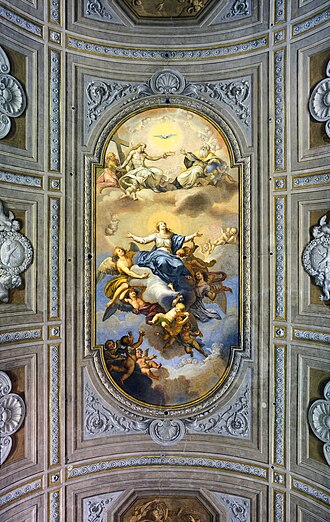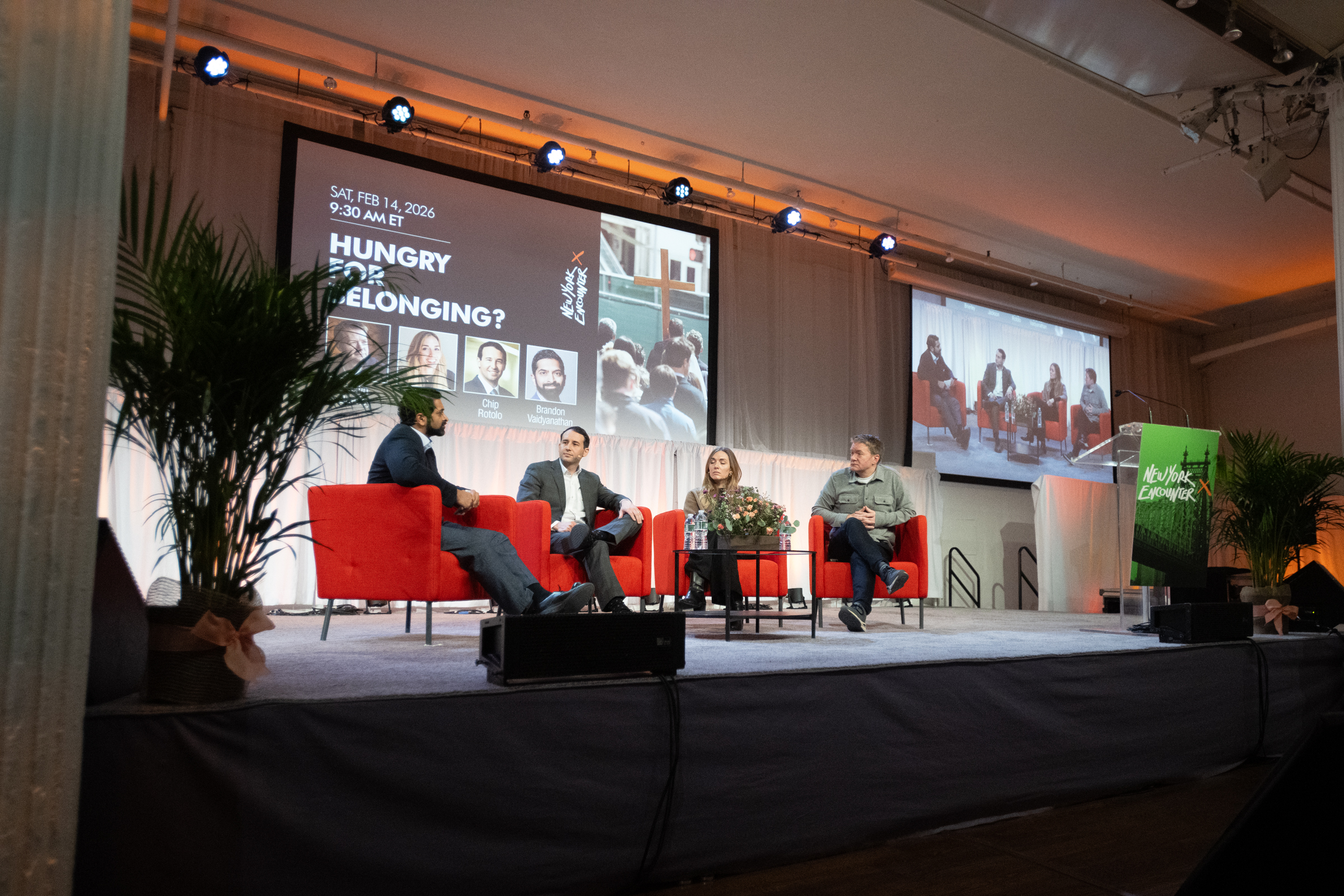
According to Pew data, the share of U.S. adults identifying as Christian is down from 2007 levels but has held steady since 2020.
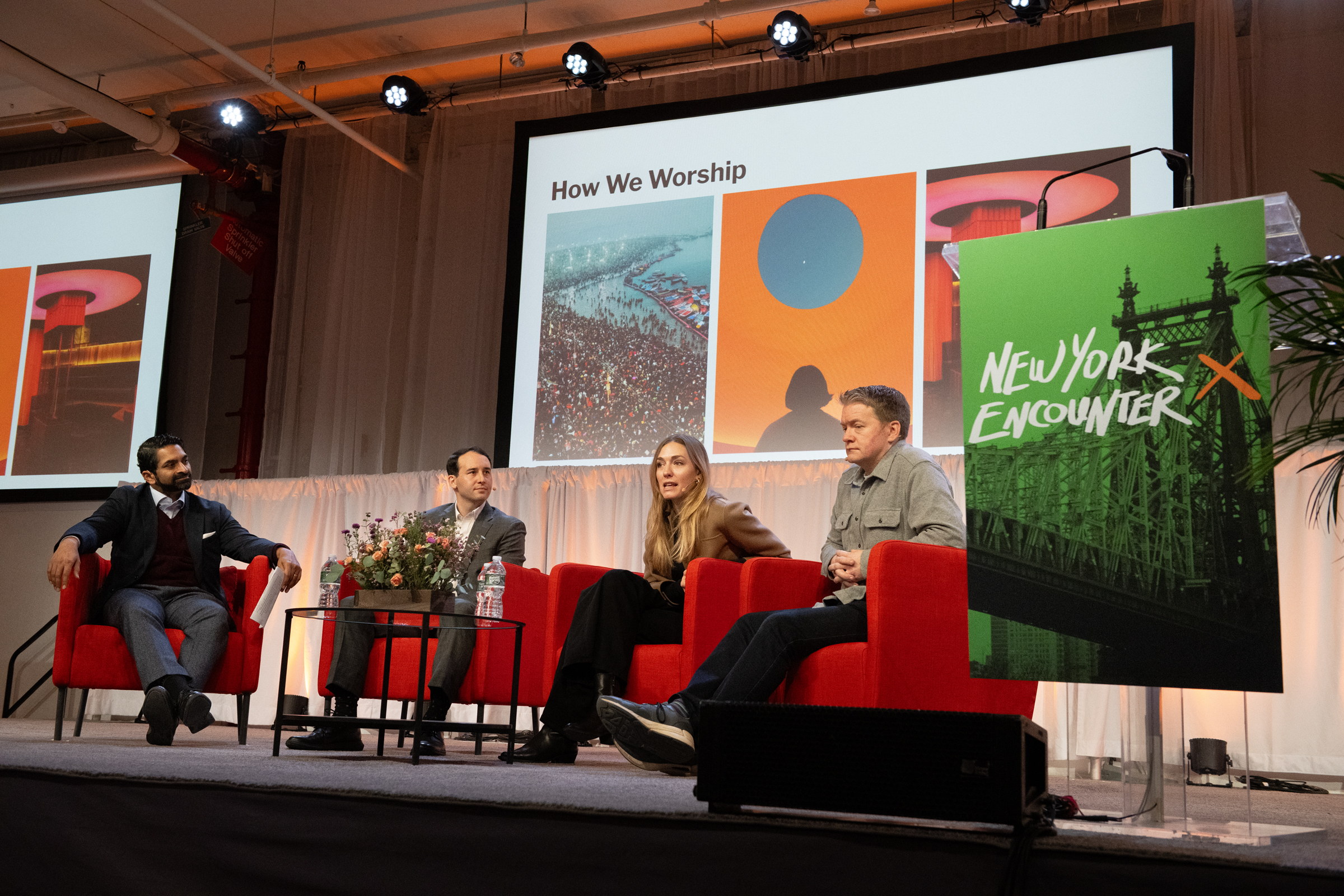

According to Pew data, the share of U.S. adults identifying as Christian is down from 2007 levels but has held steady since 2020.

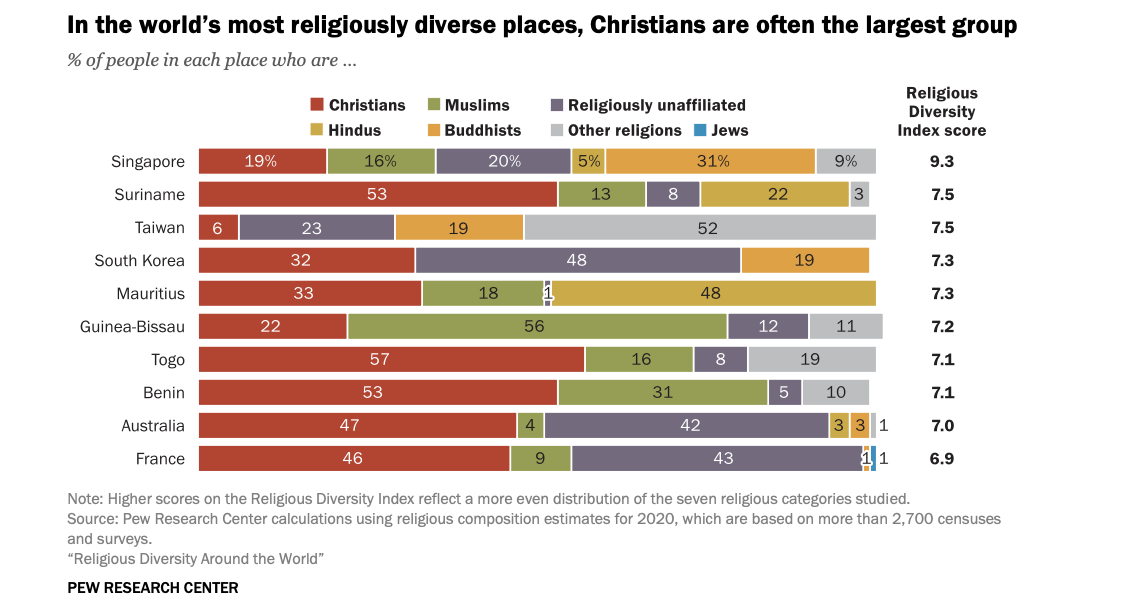
Among the most populous nations, the U.S. ranks first in religious diversity. Singapore is the most religiously diverse country overall, and the U.S. ranks 32nd.
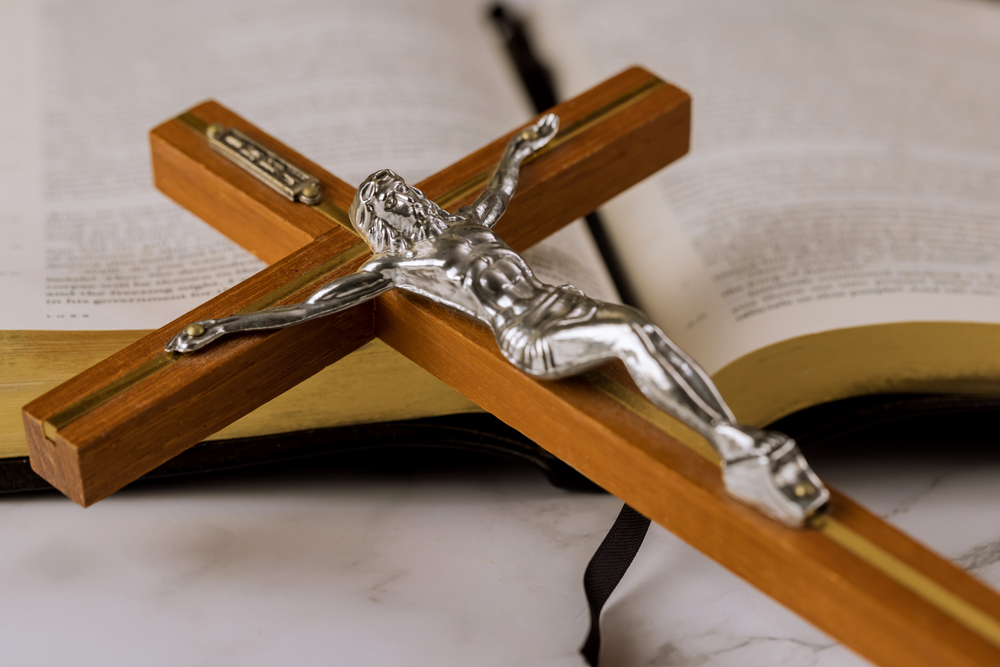
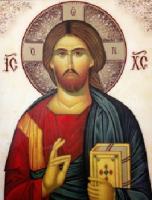
![Catholic convert Eva Vlaardingerbroek on censorship and immigration in Europe #Catholic Catholic Dutch political commentator and activist Eva Vlaardingerbroek said “the rule of law is dead” in Europe and detailed the issues of censorship and immigration on the continent.Vlaardingerbroek is an attorney and Catholic convert who has been outspoken about European immigration, national sovereignty, and free speech. Recently, the U.K. government banned her from entering the country due to her outspoken views.“Out of the blue, I saw that I had received an email from the U.K. government,” she told Raymond Arroyo on EWTN’s “The World Over with Raymond Arroyo.” It was “just a couple of sentences saying that my ETA, which is the travel authorization that Europeans need to travel to the U.K., had been revoked.”The reason they stated “was that I am ‘not conducive to the public good,’” she said. Vlaardingerbroek said she believes the ban occurred because she criticized the prime minister of the United Kingdom, Keir Starmer, on social media three days before receiving the email.The situation shows that “the rule of law is dead in Europe,” Vlaardingerbroek said. “Because if you get a notification like that out of the blue, you have no ability, no means to defend yourself … I don’t have a criminal record. I didn’t commit a crime.”“I got converted to Catholicism in the United Kingdom, so I have a couple of really dear friends there. Now, I’m no longer able to go because I say the wrong things, apparently. That is the state of Europe right now … They either throw you in jail or they make sure that you can’t enter the country. That’s what happens in the United Kingdom if you go against the grain,” she said.European immigrationVlaardingerbroek has also been outspoken about illegal immigration in Europe and said that mass immigration has destabilized Europe and led to spikes in violent crimes.“Anyone with two eyes can see that it’s true,” she said. Everyone who lives here, apart from maybe people living in ivory towers or in areas where there are no immigrants, everyone who lives in the real world knows that it’s true.”“I will continue speaking the truth about what I see happening to this beautiful continent of ours because it’s being destroyed,” she said. “We see churches burning down every week here in Europe, and that’s not a coincidence. That didn’t happen for hundreds of years, and suddenly now … they’re burning down faster than I can count.”“You can break the law coming here. It’s not being punished. In fact, it’s rewarded because people get to stay, people get free housing, people get free health care, and they’re able to just roam around even awaiting whether they are going to get their asylum approved or not.”“The governments and the legal system seem to be working hand in hand” and the “judges are complicit,” Vlaardingerbroek said. In Europe, the migrants that commit crimes are not held accountable because judges believe “they are traumatized because they come from a war zone” or due to their “their mental state.”“Then what ends up happening is these immigrants who rape, kill, and assault the native population, they just don’t get any real prison time, and they definitely do not get deported,” she said.“I think that this is a holdover from World War II,” she continued. Institutions including the European Union have “given evil one face and one face only” and “they refuse to see the difference between a Nazi and a conservative Christian.”“To them, it’s all the same, and that’s the way that they treat us,” she said. “I don’t think they’re afraid to acknowledge it. I think they honestly don’t care. I mean, the churches that are being burned down in France that we see, that’s a physical thing unfolding in front of our eyes.”The burning of churches “is powerful imagery that should wake people up to something else, something invisible, which is the agenda that is being carried out here to erode Christianity,” Vlaardingerbroek said.When the European Union discusses European culture, identity, and history, “they never mention Christianity,” Vlaardingerbroek said.“They actively removed it from their documents. They talk about the Enlightenment, but Christianity is never mentioned. They are actively eroding and erasing Christianity here in Europe because it threatens their agenda, because these people see [themselves] as God,” she said.U.S. immigrationAs debates over Immigration and Customs Enforcement (ICE) and law enforcement continue in the U.S, Vlaardingerbroek also discussed the status of immigration on this side of the pond.“As a Catholic, of course, we can be charitable. Nobody’s saying that we cannot allow some immigration or that we cannot help those in need. That is, of course, a Catholic ideal. That is a Catholic value … That’s what our legal system reflects,” she said.“That doesn’t mean, however, that when you come here illegally, which is what happens the majority of the time, and you break [the] laws, that we have to sit by and watch that happen.”ICE agents “are doing their job,” Vlaardingerbroek said. “They are enforcing the law. I think it’s a disgrace the way that they are being treated.”“I wish actually that here in Europe, we would have our version of ICE and that they would … send back home the people who come here illegally and who do not belong in these countries and who actively fight everything that we stand for, both in America and here in Europe,” Vlaardingerbroek said. Catholic convert Eva Vlaardingerbroek on censorship and immigration in Europe #Catholic Catholic Dutch political commentator and activist Eva Vlaardingerbroek said “the rule of law is dead” in Europe and detailed the issues of censorship and immigration on the continent.Vlaardingerbroek is an attorney and Catholic convert who has been outspoken about European immigration, national sovereignty, and free speech. Recently, the U.K. government banned her from entering the country due to her outspoken views.“Out of the blue, I saw that I had received an email from the U.K. government,” she told Raymond Arroyo on EWTN’s “The World Over with Raymond Arroyo.” It was “just a couple of sentences saying that my ETA, which is the travel authorization that Europeans need to travel to the U.K., had been revoked.”The reason they stated “was that I am ‘not conducive to the public good,’” she said. Vlaardingerbroek said she believes the ban occurred because she criticized the prime minister of the United Kingdom, Keir Starmer, on social media three days before receiving the email.The situation shows that “the rule of law is dead in Europe,” Vlaardingerbroek said. “Because if you get a notification like that out of the blue, you have no ability, no means to defend yourself … I don’t have a criminal record. I didn’t commit a crime.”“I got converted to Catholicism in the United Kingdom, so I have a couple of really dear friends there. Now, I’m no longer able to go because I say the wrong things, apparently. That is the state of Europe right now … They either throw you in jail or they make sure that you can’t enter the country. That’s what happens in the United Kingdom if you go against the grain,” she said.European immigrationVlaardingerbroek has also been outspoken about illegal immigration in Europe and said that mass immigration has destabilized Europe and led to spikes in violent crimes.“Anyone with two eyes can see that it’s true,” she said. Everyone who lives here, apart from maybe people living in ivory towers or in areas where there are no immigrants, everyone who lives in the real world knows that it’s true.”“I will continue speaking the truth about what I see happening to this beautiful continent of ours because it’s being destroyed,” she said. “We see churches burning down every week here in Europe, and that’s not a coincidence. That didn’t happen for hundreds of years, and suddenly now … they’re burning down faster than I can count.”“You can break the law coming here. It’s not being punished. In fact, it’s rewarded because people get to stay, people get free housing, people get free health care, and they’re able to just roam around even awaiting whether they are going to get their asylum approved or not.”“The governments and the legal system seem to be working hand in hand” and the “judges are complicit,” Vlaardingerbroek said. In Europe, the migrants that commit crimes are not held accountable because judges believe “they are traumatized because they come from a war zone” or due to their “their mental state.”“Then what ends up happening is these immigrants who rape, kill, and assault the native population, they just don’t get any real prison time, and they definitely do not get deported,” she said.“I think that this is a holdover from World War II,” she continued. Institutions including the European Union have “given evil one face and one face only” and “they refuse to see the difference between a Nazi and a conservative Christian.”“To them, it’s all the same, and that’s the way that they treat us,” she said. “I don’t think they’re afraid to acknowledge it. I think they honestly don’t care. I mean, the churches that are being burned down in France that we see, that’s a physical thing unfolding in front of our eyes.”The burning of churches “is powerful imagery that should wake people up to something else, something invisible, which is the agenda that is being carried out here to erode Christianity,” Vlaardingerbroek said.When the European Union discusses European culture, identity, and history, “they never mention Christianity,” Vlaardingerbroek said.“They actively removed it from their documents. They talk about the Enlightenment, but Christianity is never mentioned. They are actively eroding and erasing Christianity here in Europe because it threatens their agenda, because these people see [themselves] as God,” she said.U.S. immigrationAs debates over Immigration and Customs Enforcement (ICE) and law enforcement continue in the U.S, Vlaardingerbroek also discussed the status of immigration on this side of the pond.“As a Catholic, of course, we can be charitable. Nobody’s saying that we cannot allow some immigration or that we cannot help those in need. That is, of course, a Catholic ideal. That is a Catholic value … That’s what our legal system reflects,” she said.“That doesn’t mean, however, that when you come here illegally, which is what happens the majority of the time, and you break [the] laws, that we have to sit by and watch that happen.”ICE agents “are doing their job,” Vlaardingerbroek said. “They are enforcing the law. I think it’s a disgrace the way that they are being treated.”“I wish actually that here in Europe, we would have our version of ICE and that they would … send back home the people who come here illegally and who do not belong in these countries and who actively fight everything that we stand for, both in America and here in Europe,” Vlaardingerbroek said.](https://unitedyam.com/wp-content/uploads/2026/02/catholic-convert-eva-vlaardingerbroek-on-censorship-and-immigration-in-europe-catholic-catholic-dutch-political-commentator-and-activist-eva-vlaardingerbroek-said-the-rule-of-law-is-dead.png)
Catholic convert Eva Vlaardingerbroek discussed immigration and the state of free speech in Europe on EWTN’s “The World Over with Raymond Arroyo.”
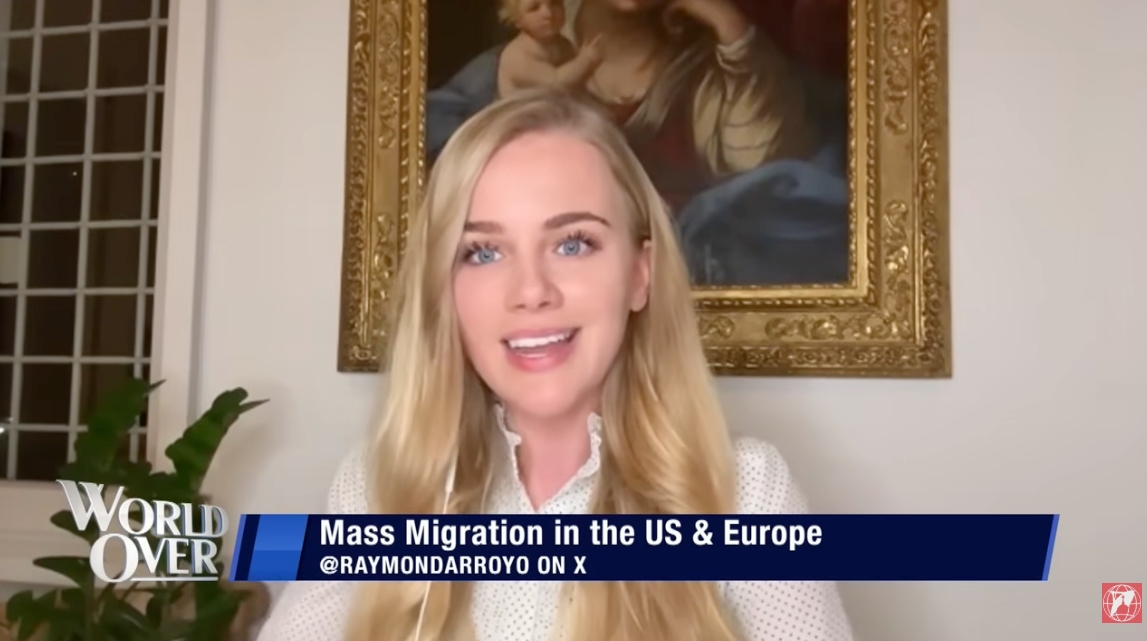
![Catholics express mixed views on first year of Trump’s second term #Catholic
With Speaker of the House Mike Johnson by his side, President Donald Trump speaks to the press following a House Republican meeting at the U.S. Capitol on May 20, 2025, in Washington, D.C. | Credit: Tasos Katopodis/Getty Images
Jan 20, 2026 / 12:21 pm (CNA).
Catholics are offering mixed reactions to the first year of President Donald Trump’s second term, which included domestic policy actions that align with U.S. bishops on gender-related issues, and also tensions over immigration, expansion of the death penalty, and reduced funding for organizations that provide food and basic support to people in need.Trump secured his electoral victory in 2024 with the help of Catholics, who supported him by a double-digit margin, according to exit polls. A Pew Research Center report found that nearly a quarter of Trump’s voters in 2024 were Catholic.Throughout his first year, Trump — who calls himself a nondenominational Christian — has invoked Christianity and created a White House Faith Office. He created a Religious Liberty Commission by executive order in May 2025 and became the first president to issue a proclamation honoring the Catholic feast of the Immaculate Conception in December.Last year, the president also launched the “America Prays” initiative, which encouraged people to dedicate one hour of prayer for the United States and its people in preparation for the 250th anniversary of the Declaration of Independence on July 4, 2026.Immigration, poverty, and NGOsJohn White, professor of politics at The Catholic University of America, said the first year of Trump’s second term “challenged Catholics on many levels.”“The brutality of ICE has caused the U.S. Conference of Catholic Bishops to issue an extraordinary statement at the prompting of Pope Leo XIV,” White said, referring to the Immigration and Customs Enforcement agency. The U.S. Conference of Catholic Bishops (USCCB) issued a special message in November opposing indiscriminate mass deportations, calling for humane treatment, urging meaningful reform, and affirming the compatibility of national security with human dignity.The Trump administration, with JD Vance, the second Catholic vice president in U.S. history, cut billions of dollars in funding to nongovernmental organizations (NGOs), which financially damaged several Catholic nonprofits that had received funding. Trump also signed into law historic cuts to the Supplemental Nutrition Assistance Program.“The cuts to NGO funding, SNAP, and Medicaid benefits, alongside the huge increases in health care costs, have hurt the poor and middle class at home and around the world,” he said. “Instead of being the good Samaritan, Trump has challenged our Catholic values and narrowed our vision of who we are and what we believe. JD Vance’s interpretation of ‘Ordo Amoris’ of a hierarchy to those whom we love rather than a universal love is a case in point and has been repudiated by Pope Francis and Pope Leo XIV,” he said.The cuts aligned federal policy with the administration’s agenda, which included strict immigration enforcement, mass deportations of immigrants who are in the country illegally, and less foreign aid support.Catholic Charities USA was previously receiving more than $100 million annually for migrant services, and the Trump administration cut off those funds. In response, the organization scaled back its services.Since Trump took office, the administration said it has deported more than 600,000 people.Karen Sullivan, director of advocacy for the Catholic Legal Immigration Network (CLINIC), which provides legal services to migrants, said she is “very concerned about the way that immigration enforcement has been carried out,” adding her organization is “very concerned that human dignity of all persons [needs to] be respected.”Sullivan said the administration is “enabling their officers to use excessive force as they are taking people into custody” and “denying access to oversight at their detention centers.” She also expressed concern about the administration increasing fees for asylum applications and giving agents more leeway to conduct immigration enforcement at sensitive locations, such as churches, schools, and hospitals.She said the large number of deportations and the increase in expedited removals has “been a strain” on organizations that seek to provide legal help to migrants.CLINIC receives inquiries from people who are facing deportation and also those who fear they may be deported. She said: “The worry and the fear among those people [who may face deportation] makes them seek out assistance and advice even more often.”“The pace of the changes that have been happening in the past year have been very difficult to manage,” she said. “We are having to respond very quickly to changes."Executive actions on genderSusan Hanssen, a history professor at the University of Dallas (a Catholic institution), viewed the first year of Trump’s second term in mostly successful terms.“As Catholics we know that the law educates, and during Trump’s first year in office we witnessed an actual shift in public opinion on the LGBT/transgender ideology due to his asserting the scientific and natural common sense that there are only male and female,” Hanssen said.Trump took executive action to prohibit what he called the “chemical and surgical mutilation” of children, such as hormone therapy and surgical transition. He signed a policy restricting participation of transgender athletes in women’s sports. He legally recognized only two genders, determined by biology: male and female.“His strong executive action on this essential point — domestically in making the executive branch remove its trans-affirming language, the executive department of education stop subverting parental rights over their children, and women’s rights in sports, and (importantly) putting an end to USAID’s [U.S. Agency for International Development] pushing this gender agenda on the countries who need our economic assistance,” she said.“This has led to a genuine public shift, with fewer independent corporations choosing to enforce June as LGBT Pride month on their customer base, fewer DEI programs pushing the gender agenda on hiring, and a shift (especially among young men) towards disapproval of gender transitioning children and even towards disapproval of the legalization of so-called same sex ‘marriage,’” she added. “We will need to see how these executive branch victories will affect judicial and legislative action moving forward.”Father Tadeusz Pacholczyk, senior ethicist at the National Catholic Bioethics Center, had a similar view of some of the social changes.“The current administration has focused significant energy on the important task of ‘putting folks on notice,’ so it’s hard to deny, for example, that the misguided medico-pharmaceutical industry that has profited handsomely from exploiting vulnerable youth and other gender dysphoric individuals can no longer miss the loud indicators that these practices will not be able to continue unabated,” he said.Death penaltyTrump signaled a renewed and more aggressive federal capital-punishment policy in 2025, in opposition to the Catechism of the Catholic Church, which teaches that the death penalty is “inadmissible.”Trump signed an executive order on his first day in office directing the Justice Department to actively pursue the federal death penalty for serious crimes. He also directed federal prosecutors to seek death sentences in Washington, D.C., homicide cases. His administration lifted a moratorium on executions, reversing a pause in federal executions and following President Joe Biden’s commutations of federal death sentences.Archbishop Timothy P. Broglio, then-president of the USCCB, in a Jan. 22, 2025, statement called Trump’s support for expanding the federal death penalty “deeply troubling.” Newly elected USCCB president Archbishop Paul Coakley likewise called for the abolition of the death penalty.](https://unitedyam.com/wp-content/uploads/2026/01/catholics-express-mixed-views-on-first-year-of-trumps-second-term-catholic-with-speaker-of-the-house-mike-johnson-by-his-side-president-donald-trump-speaks-to-the-press-following-a-hous.jpg)

Jan 20, 2026 / 12:21 pm (CNA).
Catholics are offering mixed reactions to the first year of President Donald Trump’s second term, which included domestic policy actions that align with U.S. bishops on gender-related issues, and also tensions over immigration, expansion of the death penalty, and reduced funding for organizations that provide food and basic support to people in need.
Trump secured his electoral victory in 2024 with the help of Catholics, who supported him by a double-digit margin, according to exit polls. A Pew Research Center report found that nearly a quarter of Trump’s voters in 2024 were Catholic.
Throughout his first year, Trump — who calls himself a nondenominational Christian — has invoked Christianity and created a White House Faith Office. He created a Religious Liberty Commission by executive order in May 2025 and became the first president to issue a proclamation honoring the Catholic feast of the Immaculate Conception in December.
Last year, the president also launched the “America Prays” initiative, which encouraged people to dedicate one hour of prayer for the United States and its people in preparation for the 250th anniversary of the Declaration of Independence on July 4, 2026.
John White, professor of politics at The Catholic University of America, said the first year of Trump’s second term “challenged Catholics on many levels.”
“The brutality of ICE has caused the U.S. Conference of Catholic Bishops to issue an extraordinary statement at the prompting of Pope Leo XIV,” White said, referring to the Immigration and Customs Enforcement agency. The U.S. Conference of Catholic Bishops (USCCB) issued a special message in November opposing indiscriminate mass deportations, calling for humane treatment, urging meaningful reform, and affirming the compatibility of national security with human dignity.
The Trump administration, with JD Vance, the second Catholic vice president in U.S. history, cut billions of dollars in funding to nongovernmental organizations (NGOs), which financially damaged several Catholic nonprofits that had received funding. Trump also signed into law historic cuts to the Supplemental Nutrition Assistance Program.
“The cuts to NGO funding, SNAP, and Medicaid benefits, alongside the huge increases in health care costs, have hurt the poor and middle class at home and around the world,” he said. “Instead of being the good Samaritan, Trump has challenged our Catholic values and narrowed our vision of who we are and what we believe. JD Vance’s interpretation of ‘Ordo Amoris’ of a hierarchy to those whom we love rather than a universal love is a case in point and has been repudiated by Pope Francis and Pope Leo XIV,” he said.
The cuts aligned federal policy with the administration’s agenda, which included strict immigration enforcement, mass deportations of immigrants who are in the country illegally, and less foreign aid support.
Catholic Charities USA was previously receiving more than $100 million annually for migrant services, and the Trump administration cut off those funds. In response, the organization scaled back its services.
Since Trump took office, the administration said it has deported more than 600,000 people.
Karen Sullivan, director of advocacy for the Catholic Legal Immigration Network (CLINIC), which provides legal services to migrants, said she is “very concerned about the way that immigration enforcement has been carried out,” adding her organization is “very concerned that human dignity of all persons [needs to] be respected.”
Sullivan said the administration is “enabling their officers to use excessive force as they are taking people into custody” and “denying access to oversight at their detention centers.” She also expressed concern about the administration increasing fees for asylum applications and giving agents more leeway to conduct immigration enforcement at sensitive locations, such as churches, schools, and hospitals.
She said the large number of deportations and the increase in expedited removals has “been a strain” on organizations that seek to provide legal help to migrants.
CLINIC receives inquiries from people who are facing deportation and also those who fear they may be deported. She said: “The worry and the fear among those people [who may face deportation] makes them seek out assistance and advice even more often.”
“The pace of the changes that have been happening in the past year have been very difficult to manage,” she said. “We are having to respond very quickly to changes."
Susan Hanssen, a history professor at the University of Dallas (a Catholic institution), viewed the first year of Trump’s second term in mostly successful terms.
“As Catholics we know that the law educates, and during Trump’s first year in office we witnessed an actual shift in public opinion on the LGBT/transgender ideology due to his asserting the scientific and natural common sense that there are only male and female,” Hanssen said.
Trump took executive action to prohibit what he called the “chemical and surgical mutilation” of children, such as hormone therapy and surgical transition. He signed a policy restricting participation of transgender athletes in women’s sports. He legally recognized only two genders, determined by biology: male and female.
“His strong executive action on this essential point — domestically in making the executive branch remove its trans-affirming language, the executive department of education stop subverting parental rights over their children, and women’s rights in sports, and (importantly) putting an end to USAID’s [U.S. Agency for International Development] pushing this gender agenda on the countries who need our economic assistance,” she said.
“This has led to a genuine public shift, with fewer independent corporations choosing to enforce June as LGBT Pride month on their customer base, fewer DEI programs pushing the gender agenda on hiring, and a shift (especially among young men) towards disapproval of gender transitioning children and even towards disapproval of the legalization of so-called same sex ‘marriage,’” she added. “We will need to see how these executive branch victories will affect judicial and legislative action moving forward.”
Father Tadeusz Pacholczyk, senior ethicist at the National Catholic Bioethics Center, had a similar view of some of the social changes.
“The current administration has focused significant energy on the important task of ‘putting folks on notice,’ so it’s hard to deny, for example, that the misguided medico-pharmaceutical industry that has profited handsomely from exploiting vulnerable youth and other gender dysphoric individuals can no longer miss the loud indicators that these practices will not be able to continue unabated,” he said.
Trump signaled a renewed and more aggressive federal capital-punishment policy in 2025, in opposition to the Catechism of the Catholic Church, which teaches that the death penalty is “inadmissible.”
Trump signed an executive order on his first day in office directing the Justice Department to actively pursue the federal death penalty for serious crimes. He also directed federal prosecutors to seek death sentences in Washington, D.C., homicide cases. His administration lifted a moratorium on executions, reversing a pause in federal executions and following President Joe Biden’s commutations of federal death sentences.
Archbishop Timothy P. Broglio, then-president of the USCCB, in a Jan. 22, 2025, statement called Trump’s support for expanding the federal death penalty “deeply troubling.” Newly elected USCCB president Archbishop Paul Coakley likewise called for the abolition of the death penalty.
Read More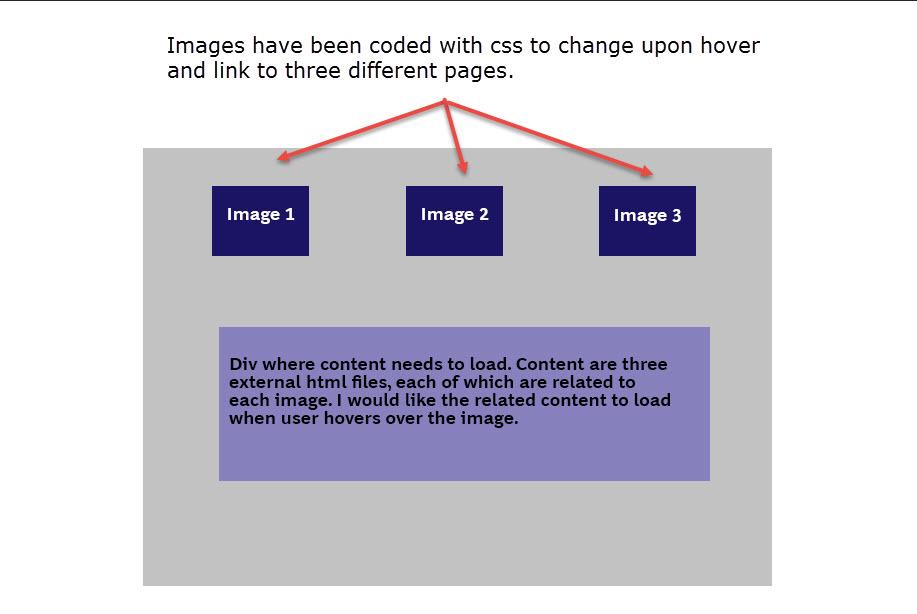
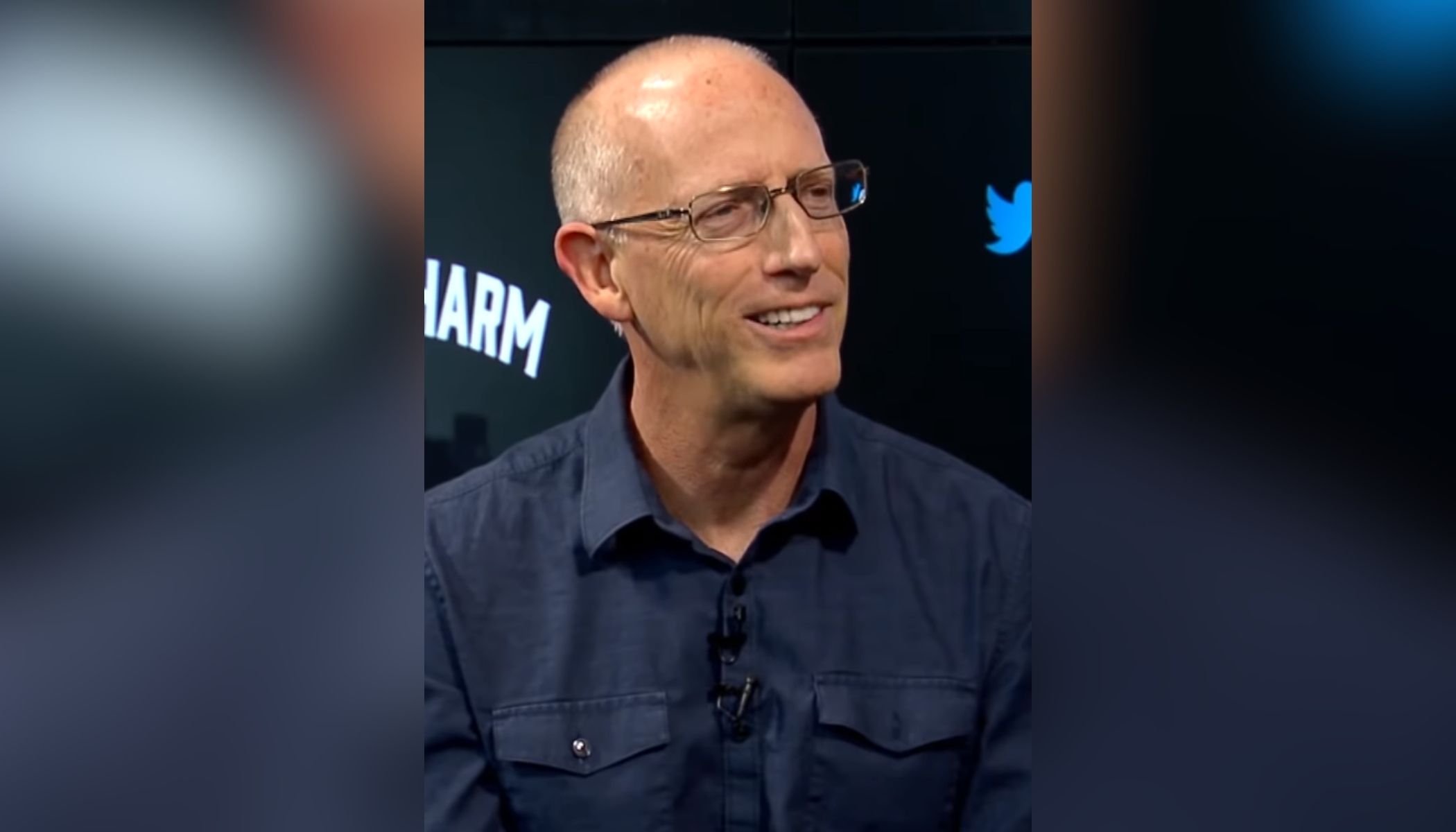

Jan 13, 2026 / 15:36 pm (CNA).
Scott Adams, the creator of the long-running “Dilbert” comic strip whose art satirized the typical American workplace, died on Jan. 13 at 68 years old after a battle with cancer.
Adams, who became known later in his career for espousing conservative and at times controversial political views, revealed in May 2025 that he was suffering from prostate cancer. The disease spread in the coming months, with Adams passing away after a short stay in hospice.
On Jan. 13, shortly after his death, Adams’ X account posted a “final message” from the renowned cartoonist in which he recalled that many of his Christian friends had urged him to convert to Christianity.
A Final Message From Scott Adams pic.twitter.com/QKX6b0MFZA
— Scott Adams (@ScottAdamsSays) January 13, 2026
“I accept Jesus Christ as my lord and savior, and I look forward to spending an eternity with him,” Adams declared in the message, adding that he hoped he was “still qualified for entry” into heaven upon his death.
“I had an amazing life. I gave it everything I had,” he wrote in the statement. “If you got any benefits from my work, I’m asking you to pay it forward as best you can. That is the legacy I want.”
Adams had previously announced his intent to convert on Jan. 1, admitting that “any skepticism I have about reality would certainly be instantly answered if I wake up in heaven.”
Born June 8, 1957, in Windham, New York, Adams began drawing from a young age. His work at the Pacific Bell Telephone Company in the 1980s and 1990s inspired many of the humorous office stereotypes portrayed in “Dilbert.”
A send-up of many of the tropes that continue to define U.S. office work, “Dilbert” became wildly popular into the 2000s and eventually included a brief television series.
Later in his career he launched the video talk series “Real Coffee With Scott Adams,” which he continued until just several days before his death.
In his final message released after his death, Adams told his fans: “Be useful.”
“And please know,” he added, “I loved you all to the end.”
Read More
